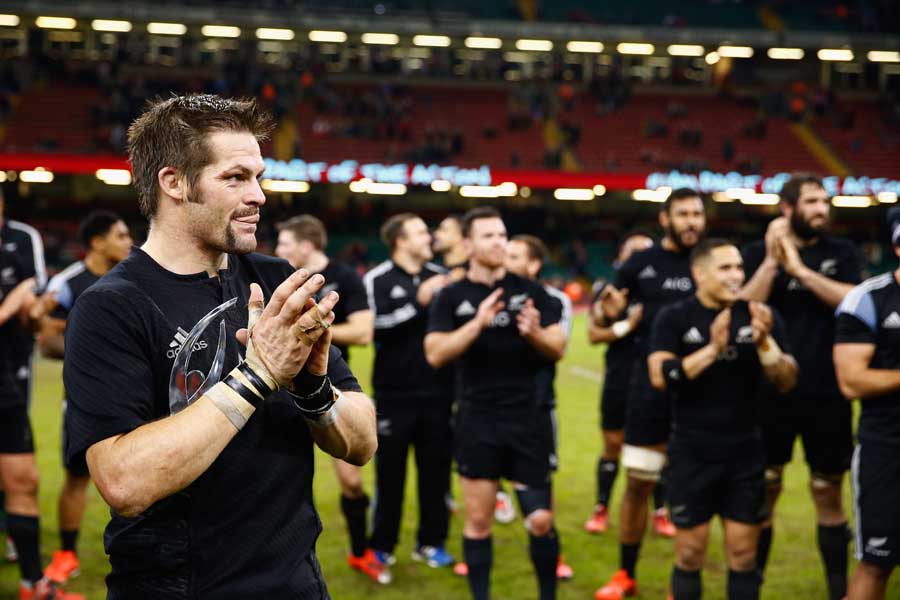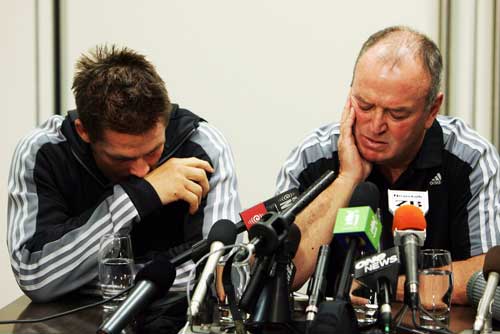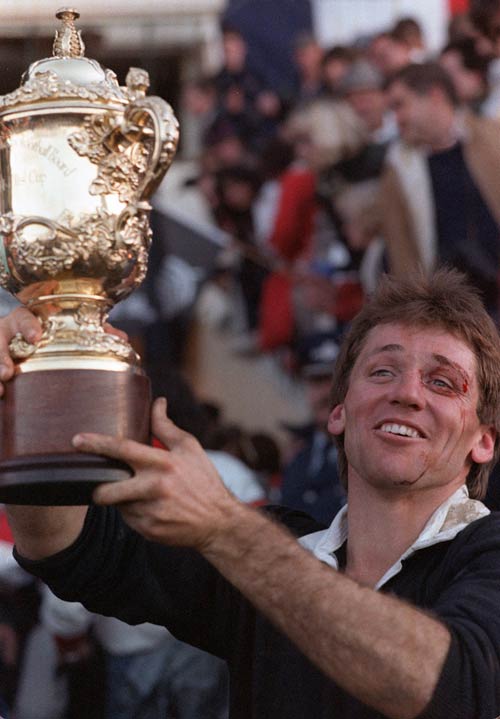|
Rugby World Cup 2015
All Blacks falling back to the chasing pack
Sam Bruce
March 10, 2015

New Zealand are the world's No.1 team but are they placed as well as we think? © Getty Images
Enlarge
The All Blacks are raging hot favourites to go back-to-back at the Rugby World Cup later this year but a couple of key factors suggest their title defence may not in fact be so clear cut, says former Wallabies prop Ben Darwin, who has been making quite a splash with his data analysis company Gain Line in a variety of sports across the globe. Darwin's decision to focus on team 'cohesion' and the relationships between players has seemingly found a hole in the sports statistics market, his formula helping clubs and national bodies find their way in the modern global marketplace. "When I stopped coaching in Japan two years ago, I tried to come up with an idea for a business and the idea for the business was to look at every player when they come off contract," Darwin told ESPN. "So I built this database of between 10,000 and 12,000 players in league and union, and just made it available to clubs." 
New Zealand have been trending downwards since 2007, Ben Darwin says
© Getty Images
Enlarge
"But what I noticed as I built this database, as I started looking at the history of each player and when I looked at the history of each player, I started to notice certain variables around certain teams that were successful against teams that weren't successful, and the historical relationships between the players were having a greater impact than the individual skill of the players." One of the All Blacks' greatest assets has been their ability to keep a core group of players together for an extended period of time; it was crucial to their 2011 World Cup triumph on home soil, albeit with a horror injury run at No.10, with the likes of skipper Richie McCaw, No.8 Kieran Read, centres Ma'a Nonu and Conrad Smith, and front-rowers Tony Woodcock, Owen Franks and Keven Mealamu all major contributors to their triumph. 
The All Blacks last went through a trough around 2001
© Getty Images
Enlarge
The All Blacks have continued to dominate world rugby as the core group of players have continued to feature strongly (outside sabbaticals), claiming three straight Rugby Championship crowns and suffering losses only to England (once) and South Africa (once). But while their cohesion has remained high, the All Blacks, according to the Gain Line theory, have in fact come back to the chasing pack. The subject of a recent Gain Line newsletter, the belief the All Blacks may actually be on the slide, is demonstrated through the "Share of Points %" - a measure Darwin says enables the dominance of a team to be shown much better than by winning percentage. "If a team scores 20 points and their opposition scores 10 then the winning team has scored 20 of the 30 points in the game giving them a Share of Points % of 67," Darwin says. "With winning percentage a team can win by 1 point or by 60 without the dominance factor being shown. Charting using this measure shows the All Blacks have had obvious performance peaks and troughs over the years." Darwin said the All Blacks had produced three peaks of Share of Points % since 1980 - around 1988, 1997 and 2007 - and three troughs - around 1984, 1994 and 2001.

New Zealand won he first Rugby World Cup final in 1987
© Getty Images
Enlarge
"These peaks and troughs seem quite indicative of a team improving, evolving and then improving again," Darwin says. "Nothing out of the ordinary. However, and this where it gets interesting, since 2007 the All Blacks' Share of Points % has been trending downwards. This is the longest period of time since 1980 that the trend has been heading down, and there is no indication yet of when this downward trend will hit an inflection point. "On the thing with the All Blacks, there's causation and there's output. And the causation is what we do with Gain Line. The output is the numbers we're talking about with the All Blacks. What you want to do when you're looking at that sort of data, you want to have something that is a consistent base you can put it back against. "So what we did is basically take the "Big Eight" Test teams and looked at how they've been going against those groups. One of the arguments we've been getting is the current All Blacks team is the greatest that's ever played, and the simple answer is that, well, from our data, it is not. And secondly they're not only not the greatest team, they're actually currently on the wane and have been since 2008. Now that's actually part of a bigger picture, and that is what we really work in, which I'd describe as 'unified theory' and what we call talent flows."

Dan Carter remains a legend of the game, but Ben darwin believes he should have been stood down in 2011 © Getty Images
Enlarge

Ben Darwin says the All Blacks will be wise to pick and stick with Aaron Cruden
© Getty Images
Enlarge
Perhaps the biggest "talent flow" question surrounds the All Blacks' No.10 jersey and just who from Dan Carter, Aaron Cruden, Beauden Barrett and possibly even Colin Slade, will be anointed as the first-choice playmaker for the World Cup. Cruden and Barrett seemingly finished 2014 as the No.1 and No.2 choices, respectively, after Carter had battled a leg injury for much of the back half of the year. And the Crusaders veteran has again been tripped up; an injury in the Christchurch-based side's opening loss to the Rebels has since seen him miss clashes with the Highlanders and, crucially, Cruden's Chiefs. Expressing the need for cohesion, Darwin said the All Blacks would be wise to pick and stick with Cruden. "We've found that with Carter over the last two years, and you can see their performances without him, that maybe they should have said to him after the last World Cup 'you're done'; and then built everything around Cruden," Darwin said. "But what they seem to be trying to do at the moment is build the team around the both of them. Now All Blacks half-back Aaron Smith is at the Highlanders, so they're not going to get any cohesion out of that scenario. Aaron Cruden is on his own there and he's sort of playing five or so Tests a year; but is that going to be enough? The best thing that could happen to the All Blacks would be a season-ending injury to Carter, and then they load up on Cruden." The real smokey on this front has been the rise of the Celtic nations. Test strength used to be more a reflection of playing numbers, but the way in which Ireland, in particular, have arranged their talent flows means they are getting the absolute maximum out of limited numbers. Scotland and Italy, too, are very slowly improving on this front. Don't look at the wins and losses but have a look at the margins. The first two World Cups probably had one or two test teams well organised from a cohesion perspective: ie. New Zealand in 1987, Australia in 1991. But this next tournament there features at least seven or eight teams competitive for this reason, even though there remains real haves and have nots among the tier-two nations. © ESPN Sports Media Ltd
|
Live Sports
Communication error please reload the page.
-
Football
-
Cricket
-
Rugby
-
- Days
- Hrs
- Mins
- Secs
F1 - Abu Dhabi GP
Abu Dhabi Grand Prix December 11-131. Max Verstappen ()
2. Valtteri Bottas (Mercedes)
3. Lewis Hamilton (Mercedes)
4. Alexander Albon ()
5. Lando Norris ()
6. Carlos Sainz Jr ()
-
ESPNOtherLive >>
Darts - Premier League
Golf - Houston Open
Snooker - China Open
Tennis - Miami Open

